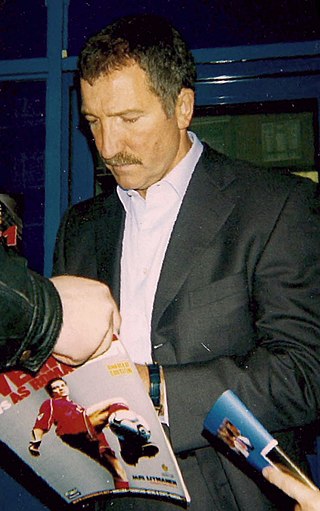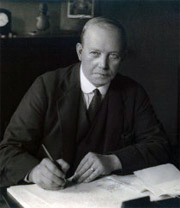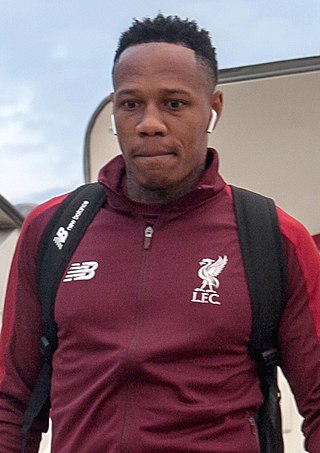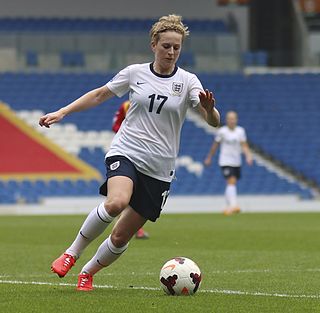
Southampton Football Club is an English professional football club based in Southampton, Hampshire, that competes in the EFL Championship, the second tier of English football. Its home ground since 2001 has been St Mary's Stadium, before which it was based at The Dell. The team play in red and white shirts. They have been nicknamed "The Saints" because of the club's beginnings as a church football team at St Mary's Church. Southampton shares a long-standing South Coast derby rivalry with Portsmouth, in part due to geographic proximity and both cities' respective maritime histories.

Goodison Park is a football stadium in the Walton area of Liverpool, England, 2 miles (3 km) north of the city centre. It has been the home of Premier League club Everton since 1892 and has an all-seated capacity of 39,414.
The 2004–05 season was the 125th season of competitive football in England.

Graeme James Souness is a Scottish former professional football player, manager and television pundit.

Steven Davis is a Northern Irish professional footballer who plays for Scottish Premiership club Rangers and the Northern Ireland national team. Davis made his full international debut in 2005 and has since been capped 140 times, scoring 13 goals, at senior level to become the most capped player in Northern Ireland, and the most capped British player of all time. He captained his nation to the last 16 at UEFA Euro 2016.

Archibald Keir Leitch was a Scottish architect, most famous for his work designing football stadiums throughout Great Britain and Ireland.

Theo James Walcott is an English former professional footballer who played as a forward. He represented England at the 2006 World Cup and Euro 2012 and has 47 caps, scoring eight goals.

Shane Patrick Long is an Irish professional footballer who plays as a striker for the Republic of Ireland national team. He also played hurling for the Tipperary county team in his early life.
The British League Cup was a football competition that was set up in April 1902 to raise money for the disaster at Ibrox Stadium, in which 25 people were killed and 517 injured at an international match between Scotland and England at the start of that month. The four clubs that participated in this competition were the winners and runners-up of the Scottish and English football leagues. It was a predecessor to the Empire Exhibition Trophy, Coronation Cup and Anglo-Scottish Cup. It succeeded the old World Championship matches between English and Scottish top clubs, as football became more widespread in the world and England-Scotland club matches could no longer be billed as World Championships.

Nathaniel Edwin Clyne is an English professional footballer who plays as a right-back for Premier League club Crystal Palace.
Abraham Hartley was a Scottish footballer.

Natasha Khalila Dowie is an English former footballer. She represented the England women's national football team at the youth level before making her senior international debut in 2009. Dowie played for the London teams Watford, Fulham and Charlton Athletic, and then spent five years with Everton before transferring to FA WSL clubs Liverpool Ladies in November 2012 and Doncaster Rovers Belles in 2016. She also spent three periods on loan with Melbourne Victory of the Australian W-League in 2015, 2016, and 2017 and played for Boston Breakers in the National Women's Soccer League (NWSL) in 2016 and 2017.

Alexander Mark David Oxlade-Chamberlain is an English professional footballer who plays as a midfielder for Süper Lig club Beşiktaş.
The 1999–2000 season was Liverpool Football Club's 108th season in existence and their 38th consecutive season in the top-flight of English football. The club finished fourth in the Premier League, thus qualifying for the 2000–01 UEFA Cup.
The 2012–13 season was the 121st season in Liverpool Football Club's existence, and their 51st consecutive year in the top flight of English football.
The 2012–13 Southampton F.C. season was the club's 14th season in the Premier League, and their 36th at the top level of English football. Having achieved consecutive promotions from League One and the Championship the previous two seasons, the club were looking to retain their place in the Premier League after a seven-year absence from the top flight. Southampton finished 14th in the league table, five points above the relegation zone. They also made it to the fourth round of the League Cup, and were eliminated from the FA Cup in the third round by Chelsea.
The 2014–15 Southampton F.C. season was the club's 16th season in the Premier League and their 38th in the top division of English football. It was also the club's first season with Dutch manager Ronald Koeman, who replaced Mauricio Pochettino on 16 June 2014. Southampton finished seventh in the Premier League, having won 18, drawn six and lost 14 matches. The club also made it to the fourth round of the FA Cup and the fifth round of the League Cup.

The 2016–17 season was Liverpool Football Club's 125th season in existence and their 55th consecutive season in the top flight of English football. It was also the club's 25th consecutive season in the Premier League. Along with the Premier League, Liverpool also competed in the FA Cup and EFL Cup. The season covered the period from 13 August 2016 to 21 May 2017. It started with a 4–3 away win against Arsenal and ended with a 3–0 home win against relegated Middlesbrough, which secured the Reds a place in the top four and qualification to the UEFA Champions League playoff round.
The 2016–17 Southampton F.C. season was the club's 18th season in the Premier League and their 40th in the top division of English football. In addition to the 2016–17 Premier League, the club also competed in the FA Cup, EFL Cup and UEFA Europa League. The season was the club's only campaign with manager Claude Puel, who took over from Ronald Koeman on 30 June 2016. The club finished eighth in the Premier League table, having won twelve, drawn ten and lost sixteen of their 38 matches played. They were knocked out of the UEFA Europa League at the group stage, having won two, drawn two and lost two of their matches, and the FA Cup in the fourth round, while they finished as runners-up in the EFL Cup Final losing 3–2 to Manchester United.
The 2022–23 Premier League Cup was the ninth edition of the competition. The defending champions were West Bromwich Albion, who defeated Wolverhampton Wanderers on penalties in the previous final. This season saw the return of a Under-21 age limit, reduced from Under-23 the previous season, with clubs permitted to use five over-age outfield players and an over-age goalkeeper in order to help with the transition.














